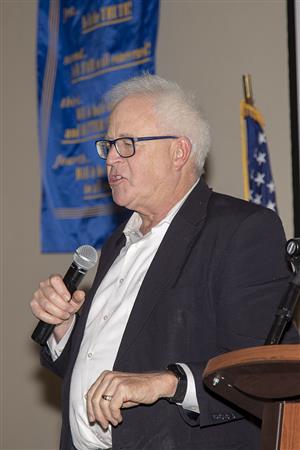 Despite the blizzard, Tim Jackson, President/CEO of the Colorado Auto Dealers Association, and Mark Zeigler, Director of Clear the Air Foundation, talked about the current status of the auto industry in Colorado, along with some of the history of that industry in the US.
Despite the blizzard, Tim Jackson, President/CEO of the Colorado Auto Dealers Association, and Mark Zeigler, Director of Clear the Air Foundation, talked about the current status of the auto industry in Colorado, along with some of the history of that industry in the US. As described by Zeigler, Clear the Air Foundation (a 501c-3 charitable corporation) has several goals: 1) replace old, polluting vehicles from the roads of Colorado (3,800+ old cars removed to date) with newer, much less polluting vehicles (pollution ratio of 1/100); 2) recycle useable parts of the old cars and destroy the engines so they cannot pollute again; 3) use the proceeds from recycling, along with various college foundations, to grant scholarships (for either training or tool purchase) to students pursuing careers in the automotive field.
Jackson pointed out that the industry has had a significant presence in Colorado since 1902 (the first Denver Auto Show), some 11 years before the advent of the Model-T, some of which were manufactured in Colorado. In the early 1900s there were some 2000 auto manufacturers in the US, compared with the fewer than 20 companies making the vast majority of cars on the road today. At the first Denver Auto Show, there were some 27 cars exhibited, all either electric- or steam-powered. That compares with today where each major manufacturer shows more models than that, and most are now powered by internal combustion engines. Those changes were started by Henry Ford who introduced the assembly line and the franchised dealer-network model for manufacture and distribution of automobiles.
Those changes have been accompanied by dramatic increases in quality (average age of cars on the road 20 years ago was 8.4 years; average age in Colorado today is 13.7 years) and safety (auto accident fatalities have decreased by 1/3 since a high in 1970 in spite of significant increases in population, rate of car ownership, and number of miles driven). According to Jackson, "there is not a bad car on the market in the US today".
There is much interest today in diversification of power source (electricity, fuel-cell, & natural gas) and development of autonomous vehicles. Electric cars account for only some 3% of the vehicles on the road sold in 2018. The total number of EVs on Colo roads (15,000) make up less than 0.2% of overall fleet which totals 5.96 million. Although there is considerable interest in increasing auto efficiency in Colorado (e.g., implementing the California standards), given the vehicle mix and altitude in Colorado, those standards will likely add several thousand dollars to the cost of a new car or truck in Colorado.
There is some question if a fully autonomous car will ever be possible. Even if it becomes reality, it is likely that most people will want a car for the family rather than sharing one with others. Thus, even though fully autonomous vehicles would probably have a significant impact on mobility of the aged and the disabled, they would probably not eliminate congestion on the roadways nor would they dramatically increase the abundance of shared rides.